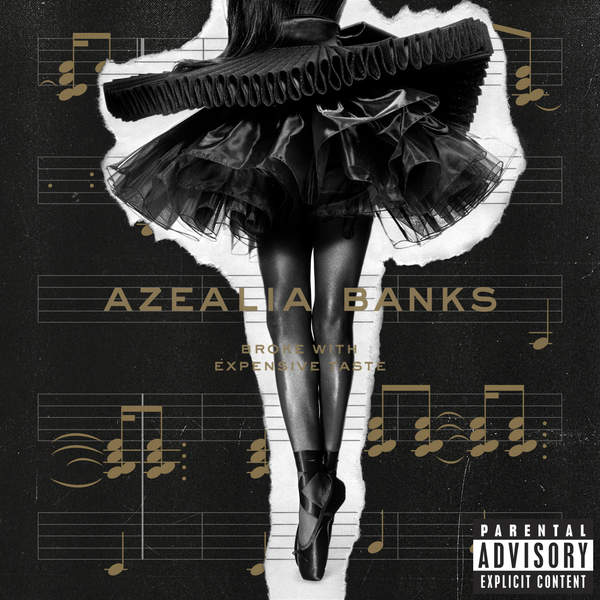
Few artists have foretold their own futures as prophetically as Azealia Banks did on “212.” The Harlem hotshot made a splash in late 2011 when she promised over a twitchy club beat that she was “the answer” — to post-Nicki Minaj female rappers, to New York rappers, to rap in general, to pop music, to something. (It was never entirely clear exactly what, and it didn’t need to be.) But after two verses of x-rated threats and shit-talking tongue-twisters, she interrupted the fun to deliver a warning — one sung not at her rivals, but at herself: “Why you procrastinate girl? / You got a lot but you just waste all yourself / They’ll forget your name soon / and won’t nobody be to blame but yourself.”
How prescient. Banks followed up her breakout track the next year with the one-two punch of the voguer’s paradise EP 1991 and the mixtape Fantasea, but she failed to deliver on her much-hyped, much-delayed debut album, Broke With Expensive Taste. Instead, she made headlines for Twitter trash-talking, unnecessary beef, empty promises and label disagreements (she begged to be released from her label and threatened to leak her own album before finally parting ways with Universal in July). That’s plenty to spoil listeners’ good will toward the 23-year-old emcee, but nothing eroded fans’ patience more than the handful of intermittently released singles since then — singles that, while occasionally close, never live up to the explosive promise of “212.”
Banks can be brash, but she isn’t stupid — which is why instead of facing diminishing returns with each attempt at renewing interest, she wisened up, quieted down and, after some light teasing, released Broke With Expensive Taste on iTunes in broad daylight Thursday. The album lives in a familiar shadow — is anything as good as “212”? — but while the answer to that inevitable question is, well, no, not really, that’s also not exactly the point. On Broke With Expensive Taste, Azealia Banks isn’t trying to finish writing the chapter she started — she’s trying to begin a new one altogether.
Several of the tracks on the album have been kicking around for months, if not years; if Banks wanted to assemble the best possible debut, she might have dusted off some of her earlier standouts, like the brassy “Jumanji” and “1991” (which Banks has called one of her all-time favorites). Those two would be more glaring omissions in Banks’ back-catalog cherry-picking if she didn’t make it clear she was interested in expanding her sound and building a cohesive body of work at the same time. The first few songs dabble in more live instrumentation (or, at least, samples of it), serving up horns, rocking bass lines and Latin percussion (that even comes with a side of Banks spitting in español on a new and improved “Gimme a Chance”). The rest of the material sticks a little closer to the house-inspired sounds she’s previously explored, but the beats are even more jagged and skittish this time, sometimes refusing to settle into a comfortable groove.
Good thing Banks can keep up as a more-than-competent singer — she studied at LaGuardia, the performing arts high school in New York where Nicki Minaj once walked the halls — and a gifted rapper. Banks is capable of some clever wordplay, but the most defining characteristic of her rapping is how she infuses it with melody: she lines up syllables like a firing squad, repeating the same sounds and hums and clicks with a sing-song-y cadence. When she’s in the zone, it’s vaguely hypnotic. The downside is that it’s also a limited tool set — her flows sometimes sound too much like her other verses. Get deep into one Azealia Banks song, and you’ll often hear a line or two that remind you of another. On the album closer “Miss Camaraderie,” she does it intentionally (and frustratingly), mimicking her flow on “Luxury,” a repurposed Fantasea track that ends just a few minutes before, almost verbatim. Banks has plenty of reason to remind listeners that she’s still the same girl who danced around in a Mickey Mouse sweater in the “212” video, but ending on a note of “Remember how cool I sounded two summers ago?” isn’t confidence-inspiring.
It’d be a more pressing problem, though, if Banks wasn’t bursting with ambition elsewhere. On “Ice Princess” she pairs slurry rhymes with a heart-pumping hook that samples EDM mainstay Morgan Page; two old cuts recycled here, “Yung Rapunxel” and “Heavy Metal and Reflective” are among her freakiest and play well off the rest of the album. Banks makes a lot of twists and turns throughout the record — perhaps none more jarring than Ariel Pink’s silly surf-rock collaboration “Nude Beach a Go-Go” — and she’s not able to keep them all from becoming unwieldy. Yet her willingness to push those buttons is refreshing. Broke With Expensive Taste exceeds expectations — and not entirely because they were low to begin with.
More Must-Reads from TIME
- Why Trump’s Message Worked on Latino Men
- What Trump’s Win Could Mean for Housing
- The 100 Must-Read Books of 2024
- Sleep Doctors Share the 1 Tip That’s Changed Their Lives
- Column: Let’s Bring Back Romance
- What It’s Like to Have Long COVID As a Kid
- FX’s Say Nothing Is the Must-Watch Political Thriller of 2024
- Merle Bombardieri Is Helping People Make the Baby Decision
Write to Nolan Feeney at nolan.feeney@time.com